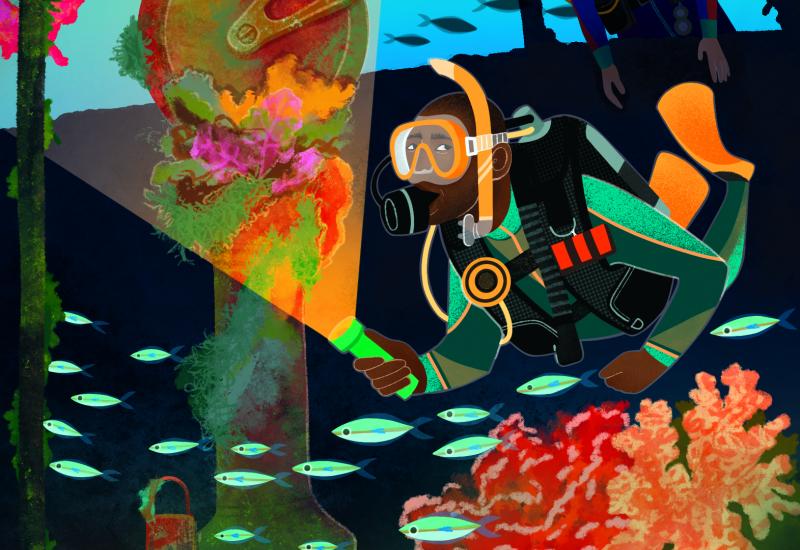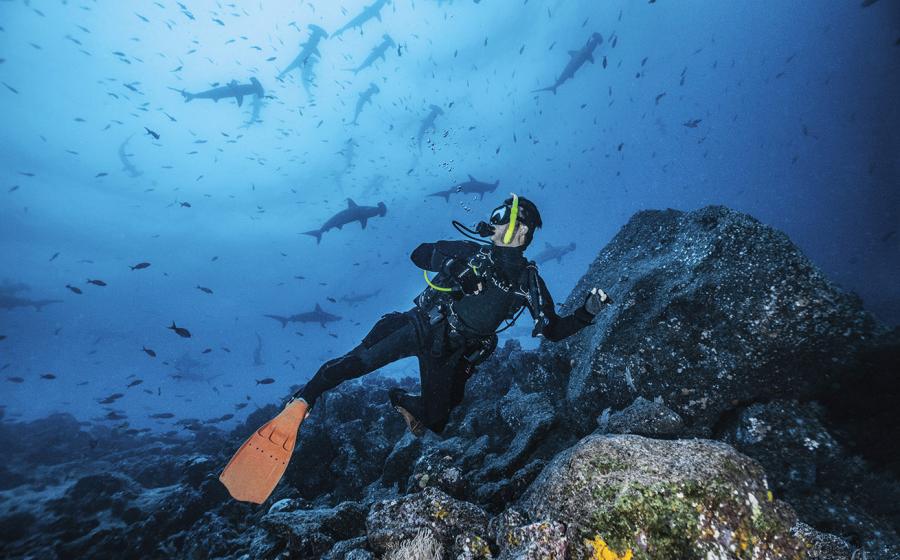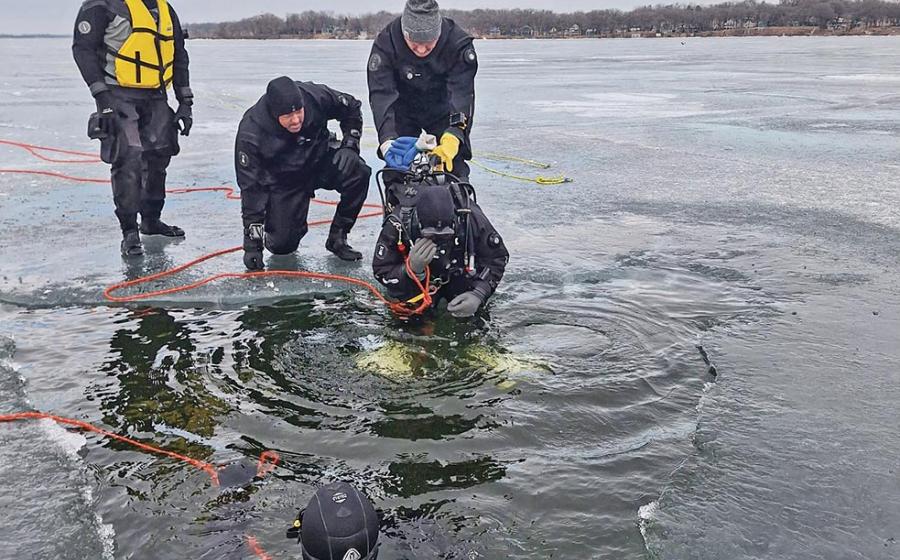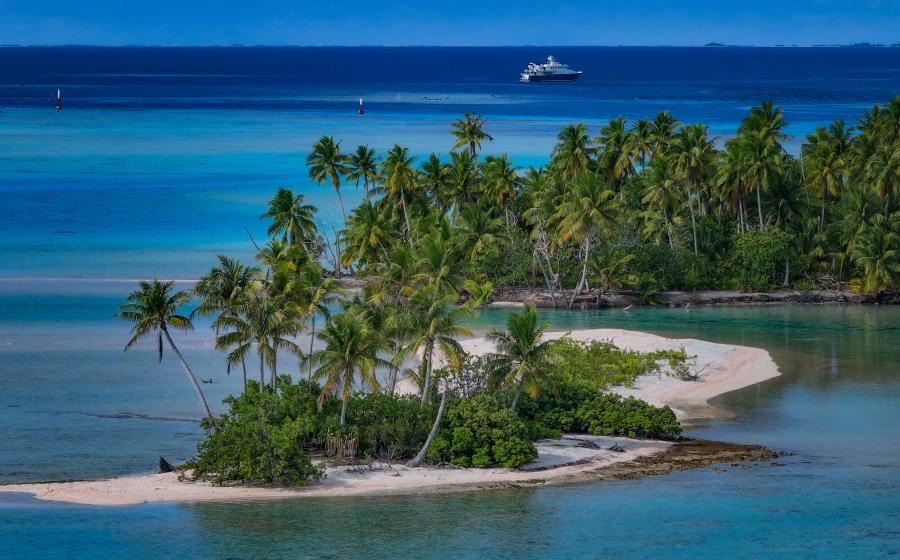Drive and Dive: Arizona's Lake Havasu
It’s a few degrees shy of the hottest place on Earth, where the Mojave and Sonoran deserts conspire with triple-digit temperatures from June through September. But in this devilish landscape roughly three hours south of Las Vegas, there’s a seemingly outrageous proposition: real-deal diving at an array of named sites and near-limitless exploratory opportunities.
Surrounded by ceaseless khaki-colored mountains and dune fields, 45-mile-long Lake Havasu — a reservoir forming the California-Arizona border — was created on the lower Colorado River in 1938 to provide water for Phoenix and Southern California. Its namesake city was established in 1963 by inventor/entrepreneur Robert McCulloch of McCulloch Motors Corporation, who famously purchased the London Bridge for nearly $2.5 million and reconstructed it in Lake Havasu City in 1971.
While the city and its waterfront have become the spring-break epicenter for every college in a 500-mile radius, its rap as a party-hearty desert outpost doesn’t faze the regional dive community of roughly 1,000 divers. The expansive lake has 450 largely undeveloped shoreline miles of public lands peppered with trails, quiet coves and numerous underwater dive sites that can be visited by divers either from shore or boat. A particular Lake Havasu exclusive is its 100-plus shore-side improved boat camps tucked into remote coves. These first-come, first-served sites with toilets, fire pits and tables are a springboard to underwater sites that rarely, if ever, see divers.
About 30 named sites comprise the greatest-hits list, with wrecks, ghost forests of flooded trees, bizarre geology, drift dives and man-made fish habitats distinguishing the desert-diving experience. If this underwater tableau sounds vaguely familiar, you might recall the 2010 horror-comedy film Piranha 3-D. The campy cult classic filmed on Lake Havasu featured awakened schools of prehistoric bloodthirsty fish that left no bikini-clad swimmer unscathed. Bikinis do abound, but the closest thing to razor-toothed fish is flittering schools of striped bass and humongous channel catfish that might pass for pelagics in these parts.
My desert-diving debut began near Black Meadow Landing, a serpentine inlet a half-hour boat ride south of town. Beginning on the lake’s eastern Arizona rim, the shore dive gently slopes to 45 feet and follows a series of fixed guidelines, enabling divers to cross into the California side. The lake bottom is generally silty, requiring divers to dial in their buoyancy so as not to kick up silt clouds. As you follow the lines, you’ll see the ghosts of Christmas past: Christmas tree “reefs” tethered by cinder blocks and PVC pipes sunk by wildlife biologists. Before the lake’s creation, trees lined the Colorado River channel, providing nooks and crannies for fish to hide and reproduce. Once the river was tamed, the trees decomposed, and by the late 1980s, Lake Havasu’s crystal-clear waters didn’t afford cover for newly spawned fish. Now, at 42 coves like Black Meadow Landing, more than 30 million farm-harvested Christmas trees have become the gifts that keep on giving by helping fish populations flourish. To date, roughly $16 million has been spent on 875 acres of these artificial reefs.
Site Five is a testament to the local dive community’s infatuation with whimsical waypoint courses. This site is on the “island” created by the dredging of Bridgewater Channel to accommodate the London Bridge. At this small cove, divers envisioned an area to train and practice various diving skills in all of 25 feet. Viz here can be extremely limited, making Site Five live up to its expectations as a place where underwater navigation is a needed skill if its prizes are to be discovered. What you’ll find are two sailboats, a small trihull vessel, a truck, and the pièce de résistance: a questionable attempt at what was supposed to be a shallow-diving submarine. Even though nylon guidelines lead to each structure, we brushed up on our compass skills and found each one on cue in the challenging 10-foot viz.
The most iconic Havasu dive site is Copper Canyon, best known for its wild spring-break parties where you could walk across the cove from boat to boat without touching water. With all those bronzed 20-somethings doing what comes naturally, a bounty of goods – namely sunglasses, watches, cellphones and unopened bottles of booze — awaits at the bottom. Finders keepers is the rule here, but aside from the spoils found at the 30-foot depths, the diving is exhilarating for its natural beauty above and below. Vertical red-rock walls extend from surface to the bottom; interesting, rugged rock formations sprout like gargoyles on cliffs and beneath the surface. If you’ve seen Piranha 3-D, the movie could even rekindle some of the silly scenes filmed here that locals have laughingly dubbed “Jaws of Lake Havasu.” Remember, desert diving is a different animal!
Next page: What You Need To Know About Lake Havasu
NEED TO KNOW:

When to go: Diving is possible year-round in Lake Havasu; March through October you avoid the gusty winter winds that affect navigation. Early June through late September, day temps usually exceed 100 degrees.
Dive conditions: Most diving takes place at 30 named and moored sites, but with 60 navigable shoreline miles, opportunities for exploratory shore dives abound. Average depth is 35 feet; maximum depth is 90 feet. Winter water temps hover around 47 degrees F and reach the high 70s by August, with a colder thermocline at 30 feet. Viz is best late spring through early summer, up to 50 feet. Drysuits and 7 mm wetsuits with hoods, gloves and booties are needed in cooler months.
Operator: As a recreational and technical-training center, full-service shop and dive- services provider, Scuba Training & Technology (scubatrainingandtechnology.com) has extensive knowledge of Lake Havasu diving, and offers beginner through advanced dive packages, including nitrox and trimix. Two-tank dive charters begin at $75 per person.
COVID-19 travel restrictions and border closings are constantly evolving. There is no guarantee that the dive sites mentioned within this article will be open at your time of travel.

ShutterstockA breath-taking view of Arizona's Lake Havasu, which is a reservoir forming the California-Arizonia border.
It’s a few degrees shy of the hottest place on Earth, where the Mojave and Sonoran deserts conspire with triple-digit temperatures from June through September. But in this devilish landscape roughly three hours south of Las Vegas, there’s a seemingly outrageous proposition: real-deal diving at an array of named sites and near-limitless exploratory opportunities.
Surrounded by ceaseless khaki-colored mountains and dune fields, 45-mile-long Lake Havasu — a reservoir forming the California-Arizona border — was created on the lower Colorado River in 1938 to provide water for Phoenix and Southern California. Its namesake city was established in 1963 by inventor/entrepreneur Robert McCulloch of McCulloch Motors Corporation, who famously purchased the London Bridge for nearly $2.5 million and reconstructed it in Lake Havasu City in 1971.
While the city and its waterfront have become the spring-break epicenter for every college in a 500-mile radius, its rap as a party-hearty desert outpost doesn’t faze the regional dive community of roughly 1,000 divers. The expansive lake has 450 largely undeveloped shoreline miles of public lands peppered with trails, quiet coves and numerous underwater dive sites that can be visited by divers either from shore or boat. A particular Lake Havasu exclusive is its 100-plus shore-side improved boat camps tucked into remote coves. These first-come, first-served sites with toilets, fire pits and tables are a springboard to underwater sites that rarely, if ever, see divers.

Robert Harding World Imagery/Getty ImagesThe London Bridge connects Thompson Bay to the Arizona side of Lake Havasu.
About 30 named sites comprise the greatest-hits list, with wrecks, ghost forests of flooded trees, bizarre geology, drift dives and man-made fish habitats distinguishing the desert-diving experience. If this underwater tableau sounds vaguely familiar, you might recall the 2010 horror-comedy film Piranha 3-D. The campy cult classic filmed on Lake Havasu featured awakened schools of prehistoric bloodthirsty fish that left no bikini-clad swimmer unscathed. Bikinis do abound, but the closest thing to razor-toothed fish is flittering schools of striped bass and humongous channel catfish that might pass for pelagics in these parts.

David R. Frazier Photography Inc./AlamyLake Havasu is an ideal place for spring-breakers to go explore its 60 miles of shoreline.
My desert-diving debut began near Black Meadow Landing, a serpentine inlet a half-hour boat ride south of town. Beginning on the lake’s eastern Arizona rim, the shore dive gently slopes to 45 feet and follows a series of fixed guidelines, enabling divers to cross into the California side. The lake bottom is generally silty, requiring divers to dial in their buoyancy so as not to kick up silt clouds. As you follow the lines, you’ll see the ghosts of Christmas past: Christmas tree “reefs” tethered by cinder blocks and PVC pipes sunk by wildlife biologists. Before the lake’s creation, trees lined the Colorado River channel, providing nooks and crannies for fish to hide and reproduce. Once the river was tamed, the trees decomposed, and by the late 1980s, Lake Havasu’s crystal-clear waters didn’t afford cover for newly spawned fish. Now, at 42 coves like Black Meadow Landing, more than 30 million farm-harvested Christmas trees have become the gifts that keep on giving by helping fish populations flourish. To date, roughly $16 million has been spent on 875 acres of these artificial reefs.

Joel SilversteinA diver observes an Army surplus Jeep.
Site Five is a testament to the local dive community’s infatuation with whimsical waypoint courses. This site is on the “island” created by the dredging of Bridgewater Channel to accommodate the London Bridge. At this small cove, divers envisioned an area to train and practice various diving skills in all of 25 feet. Viz here can be extremely limited, making Site Five live up to its expectations as a place where underwater navigation is a needed skill if its prizes are to be discovered. What you’ll find are two sailboats, a small trihull vessel, a truck, and the pièce de résistance: a questionable attempt at what was supposed to be a shallow-diving submarine. Even though nylon guidelines lead to each structure, we brushed up on our compass skills and found each one on cue in the challenging 10-foot viz.

Joel SilversteinTraining platforms like this one at lake Havasu's Site Five allow divers to practice navagational skills in low viz.
The most iconic Havasu dive site is Copper Canyon, best known for its wild spring-break parties where you could walk across the cove from boat to boat without touching water. With all those bronzed 20-somethings doing what comes naturally, a bounty of goods – namely sunglasses, watches, cellphones and unopened bottles of booze — awaits at the bottom. Finders keepers is the rule here, but aside from the spoils found at the 30-foot depths, the diving is exhilarating for its natural beauty above and below. Vertical red-rock walls extend from surface to the bottom; interesting, rugged rock formations sprout like gargoyles on cliffs and beneath the surface. If you’ve seen Piranha 3-D, the movie could even rekindle some of the silly scenes filmed here that locals have laughingly dubbed “Jaws of Lake Havasu.” Remember, desert diving is a different animal!
Next page: What You Need To Know About Lake Havasu

ShutterstockFuel up on banana-nut French toast at Makai Café overlooking Bridgewater Channel, where you’ll board the 42-foot M/V Explorer pontoon dive vessel with Scuba Training & Technology for shakedown dives at Black Meadow Landing a half-hour south. Come evening, nothing beats the pizzas and craft beers at local lakeside fave Barley Brothers Restaurant & Brewery.

Courtesy of London Bridge ResortCheck out the lake’s deepest dive, Deep Hole, and the playful rope course at Site Five. In the afternoon, hike the 5-mile Crack in the Mountain Trail, showcasing the slot-canyon geology of the Sonoran Desert. At the London Bridge Resort’s Martini Bay, enjoy spectacular sunsets, cocktails and live entertainment before calling it a night in plush-but-affordable rooms.

George H.H. Huey/AlamyAfter final early dives at the Miller’s Folly wreck or Copper Canyon, see the most spectacular part of the lake by kayak from Sandbar Power Sports. At quiet Topock Gorge you’ll paddle beneath colorful, steep rock walls that form a mini Grand Canyon.
NEED TO KNOW:

Scuba DivingArizona's Lake Havasu
When to go: Diving is possible year-round in Lake Havasu; March through October you avoid the gusty winter winds that affect navigation. Early June through late September, day temps usually exceed 100 degrees.
Dive conditions: Most diving takes place at 30 named and moored sites, but with 60 navigable shoreline miles, opportunities for exploratory shore dives abound. Average depth is 35 feet; maximum depth is 90 feet. Winter water temps hover around 47 degrees F and reach the high 70s by August, with a colder thermocline at 30 feet. Viz is best late spring through early summer, up to 50 feet. Drysuits and 7 mm wetsuits with hoods, gloves and booties are needed in cooler months.
Operator: As a recreational and technical-training center, full-service shop and dive- services provider, Scuba Training & Technology (scubatrainingandtechnology.com) has extensive knowledge of Lake Havasu diving, and offers beginner through advanced dive packages, including nitrox and trimix. Two-tank dive charters begin at $75 per person.










